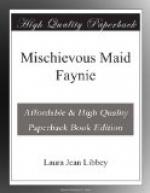They would never know anything about that previous marriage with Faynie, and the dead could tell no secrets.
“I’ll go,” he muttered. “I shall reply at once, telling her she may expect me two days hence—let me see, this is Tuesday; I will dine with her Thursday, and, at least, see what the girl Claire looks like. It would be the proper caper to gather in as many fortunes as drift my way. I suppose I shall run through half a dozen of them ere I reach the end of my tether.”
All in due season his letter of acceptance reached Mrs. Fairfax, and she was highly elated over it.
She had seized upon her neighborly acquaintance with the late Mr. Marsh to invite to her home the young man who had fallen heir to his millions, in order that her daughter Claire might win him—if it were a possibility.
She had succeeded in forcing Faynie to remain beneath that roof, even after informing her that she was disinherited—dependent upon her stepmother—by saying that it was her father’s wish that she should thus remain for at least six months.
Mrs. Fairfax’s real reason was that the outside world would not know just how affairs stood in the family until she had had time to turn everything into cash and get over to Europe to look up another millionaire widower.
On the very night that Faynie had returned so unceremoniously there had been a most thrilling scene but an hour before between Mrs. Fairfax and her daughter.
Unable to sleep, Claire had wandered down to her late stepfather’s library in search of a book.
She was not a little surprised to see her mother there—writing—at that late hour.
Her footsteps had made no sound on the thick velvet carpet, and she stole up to her side quite unobserved, looking over her shoulder to see what interested her mother so deeply.
One—two—–three—four—five minutes she stood there, fairly rooted to the spot, then a gasp of terror broke from her white lips, causing her mother to spring to her feet like a flash.
“Claire!” she exclaimed, hoarsely, trembling like an aspen leaf and clinging to the back of the nearest chair for support. “How long have you been here?” she gasped.
“Quite—five—minutes,” whispered the girl.
“And you have seen—” The mother looked into the daughter’s eyes fearfully, not daring to utter the words trembling on her lips.
“I saw you change the—the will!” whispered Claire, in a terror-stricken voice. “I saw you erase with a green fluid, which must have been a most powerful chemical, the words of the will, ‘to my daughter Faynie’ in the sentence: ‘I bequeath all of my estate, both personal and real,’ and insert therein the words, ‘my wife, Margaret’ in place of ’my daughter Faynie.’”
The woman stepped forward and clutched the girl’s arm.
“It was for your sake, Claire, that I did it,” she whispered, shrilly; “he cut us off with almost nothing, giving all to that proud daughter Faynie of his. We would have had to step out into the world—beggars again. We know what it is to be poor—ay, in want; we could never endure it again—death would be easier for both of us.




